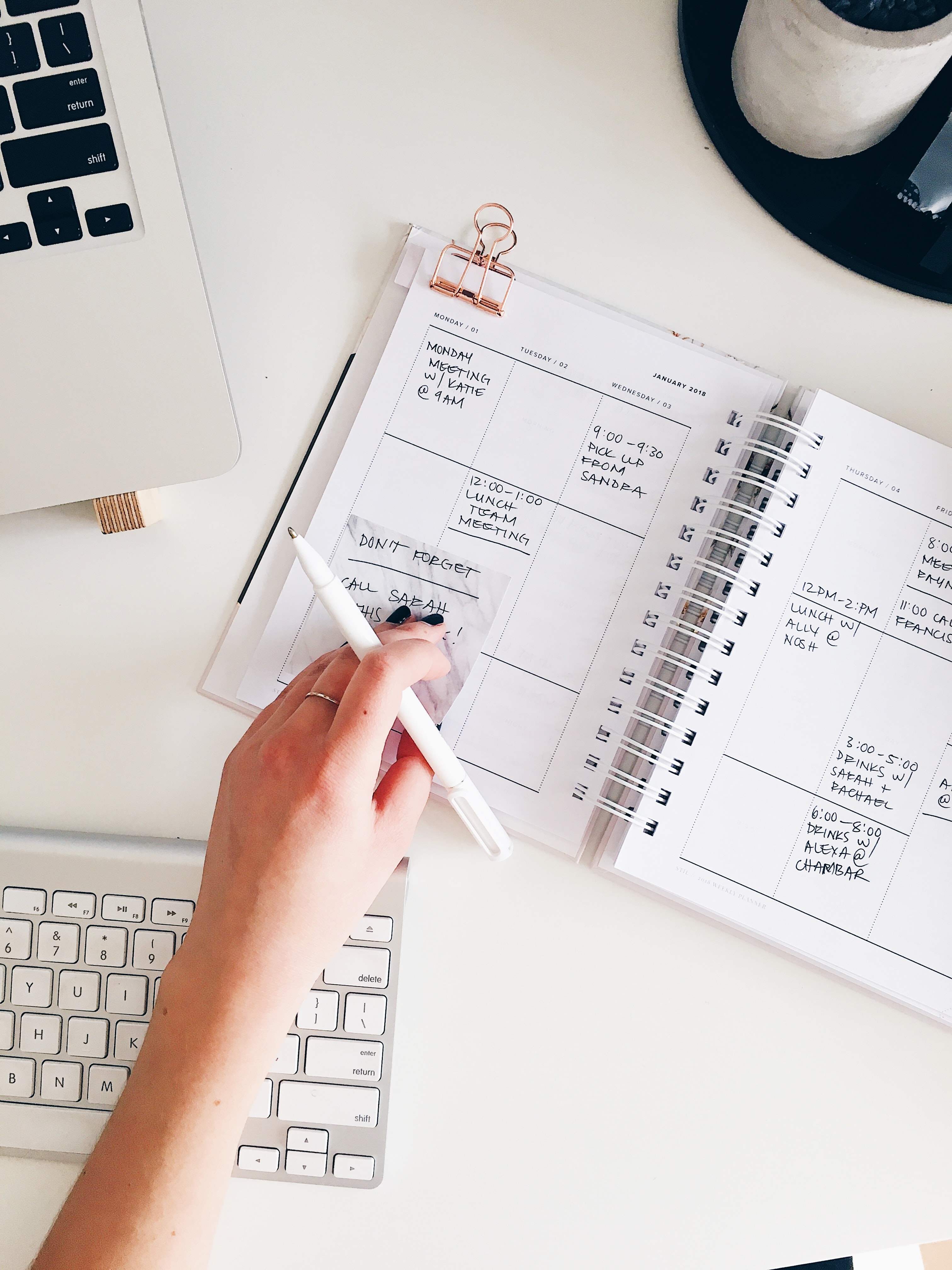5 Ways You’re Sabotaging Your Own Productivity (and How to Stop)

Have you ever found yourself working long hours, yet feeling like you're not making any progress? Do you constantly feel stressed and overwhelmed, despite your best efforts to be productive?
The truth is many of us unknowingly sabotage our own productivity with bad habits and counterproductive behaviours. From multitasking to procrastination, these habits can leave us feeling frustrated and unproductive.
But the good news is that by recognizing and addressing these habits, we can take control of our productivity and achieve more in less time. Here are 5 common ways I see people sabotage their own productivity, and some easy ways to overcome them.
1. Shiny Object Syndrome
In my first few years in business, this was the major cause of why I didn’t make as much progress as I would have liked. I would sign up for every free course, X day challenge, bootcamps, free lead magnets, and joined all the Facebook groups telling how I could do things.
Every time I turned around there was another person with an offer that roped me in as they spoke my language and they knew what I needed help with. Only problem was, I was so caught up with all the shiny objects and new things, I was not doing any productive work. Just consuming content!
Do you have a habit of getting distracted by new ideas or opportunities?
Are you constantly chasing after the latest and greatest idea, without ever finishing the project at hand?
This habit is an easy trap to fall into for entrepreneurs and creatives, who often have no shortage of new ideas.
While it’s important to be open to new possibilities, chasing after every shiny object that comes your way can be a major productivity killer!
Instead of signing up for all things new, stay focused on your goal and projects that are important to you, and be disciplined about staying on track.
👉👉 It’s ok to sign up for something that is relevant to helping you move toward your current goal. It’s also ok to recognise something is there, but now is not the right time, and saying no. (Keeping a list of future training's of interest is a great way to manage this, and be able to move on and not be distracted)

2. Task Switching
Are you constantly switching between tasks, responding to emails, and checking social media?
This kind of multitasking can be a huge drain on your productivity, and it takes time for your brain to refocus each time you switch gears.
According to a University of California Irvine study, “it takes an average of 23 minutes and 15 seconds to get back to the task.”
When I worked in the corporate world distractions were one of my biggest problems for productivity.
Although we can’t predict an emergency phone call, or someone in our house or office interrupting us, we can put measures in place to stop us from interrupting ourselves.
👉🧐 Some ideas are:
- Closing down web pages to socials and emails, or email apps while working on another task;
- If googling is another distractor and you don’t need it for your current task, close your browser down too;
- Have a “go to” document that you have open to allow yourself to write a quick note if something comes to mind, and then you can forget it for now and come back to it later. This avoids googling an idea or going off on a tangent when your energy should be focused elsewhere. I use OneNote for this now, as it is on all my devices and is easy to access;
- Scheduling time in your calendar to do the things you find are your “rogue” habits – e.g Schedule a block of time for mindless scrolling of social media, or a few different blocks of time during the day for checking email;
- Get into the habit of batching tasks and focusing on one thing at a time;
- Putting a post-it note on your computer monitor to help remind me you to stay focused on the task;
👉🤩 A winner for me lately is to put on noise-cancelling headphones with relaxing music with no lyrics (think day spa music) or sometimes I don’t even press play. It is the act of having them sitting on my ears that has some psychological effect that helps me go into the zone to do something uninterrupted.

3. Phone and Notification Addiction
Are you constantly checking your phone or email notifications throughout the day?
Do you feel you have to respond to texts and messages straight away?
This can be a major productivity killer as it takes your attention away from the task at hand and in some cases can be a source of unnecessary stress (depending on what the notification is!)
Don’t worry, you are not alone!
Personally, I go through cycles where I am super disciplined to phases where I am responding to texts back and forth for an hour. I have found I am more easily distracted when I am not feeling the “love” for the task I am working on, be it, creativity is not flowing or I have been sitting for too long, and actually need a break. Putting measures in place helps to avoid these times.
👉👉 Ways to break the habit of this are:
- Putting your phone on a focus setting to stop any notifications coming up;
- Putting an app on your phone that locks you out of certain apps for a length of time, allowing you to gradually develop the habit of not going into these on autopilot;
- Setting up a timer in the settings on your phone which locks out access to certain apps once you have spent a certain length of time on them a day (great for social media);
- Taking off notifications on apps, this will mean something like Instagram or Facebook doesn’t notify you every time you get a comment or a like or a message. You can check these things when it is the “scheduled time” for these tasks instead;
- Leaving your phone in another room altogether;
- Take regular breaks from batch tasks to stretch your body and free your mind, allowing a moment for these tasks to be done quickly – like waiting for the kettle to boil and you check a few notifications (provided you don’t go down the rabbit hole!)
- Setting boundaries with family and friends so they know if you don’t respond you are not ignoring them, but in fact, working!

4. Not Planning
Do you dive into projects without a clear plan in place?
Do you sit down at your desk to work, and don’t know what you should be working on?
Failing to plan is planning to fail – Benjamin Franklin
By not having a plan in place, we don’t know what tasks take priority. It can lead to wasted time, missing deadlines, and a lack of direction.
👉 Take the time to map out your goals. Break your goals into milestones, and then further into tasks required to reach those milestones. Then plan and schedule these tasks.
By knowing what you are working on you will avoid wasting time on tasks that don’t move you closer to your goals. Having a clear plan in place will help you to stay focused and productive, and reduce the chances of getting sidetracked along the way.
👉 Follow up this process with what I call a weekly “CEO Date” which allows you to plan and tweak next week's schedule and review the past week and what you have achieved.

5. Not Knowing Your End Goal
Do you find yourself working aimlessly, without a clear understanding of what you’re trying to achieve?
Do you work on a task to get it completed but you really don’t know what the purpose of it is and how it fits into the big picture?
It is difficult to stay motivated and focused when you don’t have a clear purpose for what you are doing. (Think going travelling and not knowing a destination.)
👉 Take the time to get clarity around what your main goal is that you are working towards. Define it and be clear on the “what” and “why”.
👣 From there you can break the goal into smaller, achievable steps required to get there. Think milestones. Your milestones will most often be broken into many tasks also. (Think google maps with all the towns you need to travel through to get to the end)
Not only does this help you to stay focused, but it also makes it easier to track your progress over time. Having a clear sense of purpose will help you stay on track and motivated, even when the going gets tough.

So, stop sabotaging your own productivity! Start to work on the habits that help you, instead of the habits that work against your efforts to be productive, leaving you feeling stressed and unproductive.
They say awareness is one of the first steps to helping solve a problem. Take some time to see what ones are holding you back.
By working on breaking these five productivity-killing habits, you can free up more time and energy to focus on the things that really matter. Whether you're trying to launch a new business, write a book, or just get more done in your day-to-day life, these tips can help you stay focused, productive, and on track. So why not give them a try today? Your productivity (and sanity) will thank you.
👉👉 And if you would like to get serious and take the next step, book a free discovery call and have a chat about how I can help you!
Need a little to work through a block and get a plan in place?
Grab one of my Free Quickfire Planning Sessions. This is my free 30 minute session to help you get a plan and know your next step you need to take!
Want to improve your productivity and simplify your systems?
Sign up to get my latest tips and updates!
And join the VIP list to be the first to know about new releases, discounts & promos before anyone else!
(I hate SPAM and will not overload your already busy inbox)


